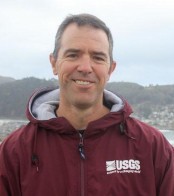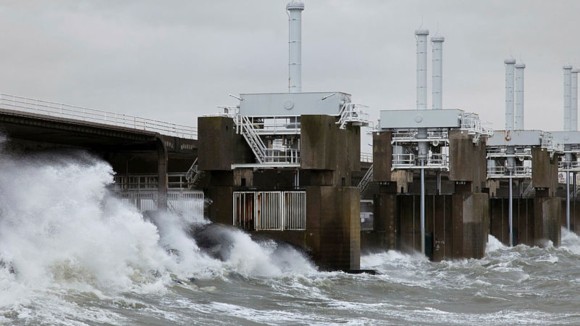 Patrick Barnard has been a Research Geologist with the USGS Pacific Coastal and Marine Science Center in Santa Cruz since 2003. His research focuses on coastal hazards driven by storms and sea level rise across U.S. beaches and estuaries. He serves on numerous regional, national, and international scientific review panels related to climate change and coastal hazards, including within the U.S. Global Change Research Program and Subcommittee on Ocean Science and Technology. Dr Barnard has been an Editorial Board Member for Scientific Reports since 2019.
Patrick Barnard has been a Research Geologist with the USGS Pacific Coastal and Marine Science Center in Santa Cruz since 2003. His research focuses on coastal hazards driven by storms and sea level rise across U.S. beaches and estuaries. He serves on numerous regional, national, and international scientific review panels related to climate change and coastal hazards, including within the U.S. Global Change Research Program and Subcommittee on Ocean Science and Technology. Dr Barnard has been an Editorial Board Member for Scientific Reports since 2019.
 Roshanka (Rosh) Ranasinghe holds the AXA Chair in Climate Change Impacts and Coastal Risk at the Department of Coastal & Urban Risk & Resilience, IHE Delft and at the Department of Water Engineering and Management, University of Twente. Rosh’s primary research interest is in developing efficient numerical models and modelling approaches to derive robust projections of different climate change impacts on coasts, quantitative assessment risks associated with climate change, and adaptation to climate change. Professor Ranasinghe has been an Editorial Board Member for Scientific Reports since 2022.
Roshanka (Rosh) Ranasinghe holds the AXA Chair in Climate Change Impacts and Coastal Risk at the Department of Coastal & Urban Risk & Resilience, IHE Delft and at the Department of Water Engineering and Management, University of Twente. Rosh’s primary research interest is in developing efficient numerical models and modelling approaches to derive robust projections of different climate change impacts on coasts, quantitative assessment risks associated with climate change, and adaptation to climate change. Professor Ranasinghe has been an Editorial Board Member for Scientific Reports since 2022.
 Joanna Staneva is a Senior Researcher and a Head of the "Hydrodynamics and Data Assimilation" Department in the Institute for Coastal Systems, Helmholtz-Zentrum Hereon, Germany. She has postdoctoral experience in sea level and climate change at Alfred-Wegener Institute for Polar and Marine Research, Germany. Her field of experience is ocean modelling, coastal and regional oceanography, wave modelling, air-sea interaction, climate change, sea level rise, Earth System Modelling and data assimilation. Dr Staneva has been an Editorial Board Member for Scientific Reports since 2021.
Joanna Staneva is a Senior Researcher and a Head of the "Hydrodynamics and Data Assimilation" Department in the Institute for Coastal Systems, Helmholtz-Zentrum Hereon, Germany. She has postdoctoral experience in sea level and climate change at Alfred-Wegener Institute for Polar and Marine Research, Germany. Her field of experience is ocean modelling, coastal and regional oceanography, wave modelling, air-sea interaction, climate change, sea level rise, Earth System Modelling and data assimilation. Dr Staneva has been an Editorial Board Member for Scientific Reports since 2021.

